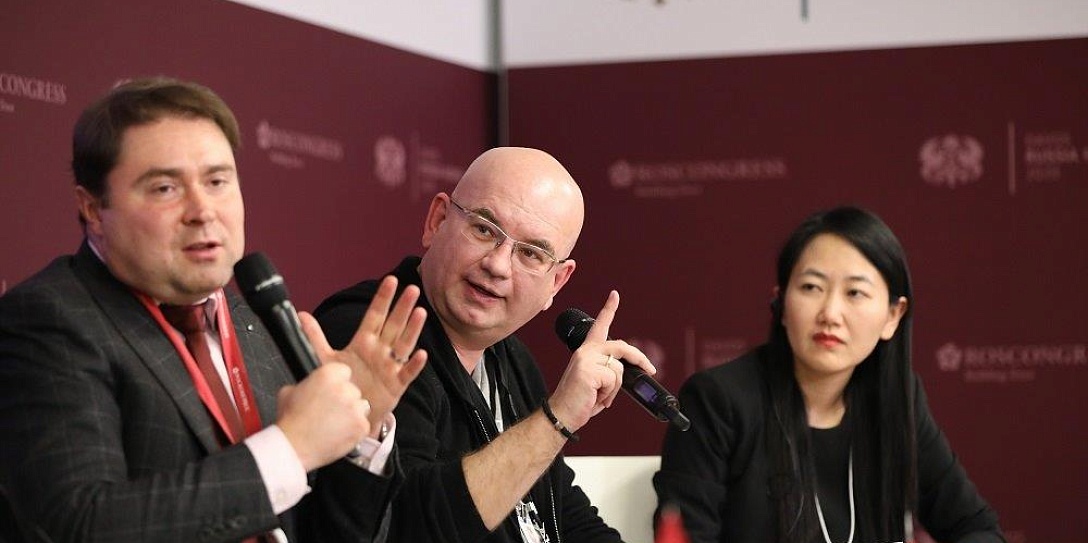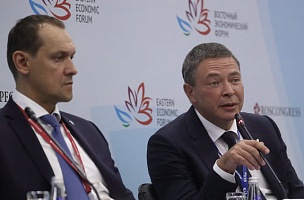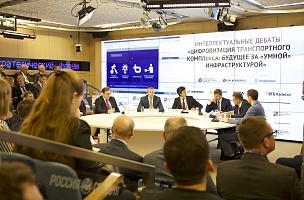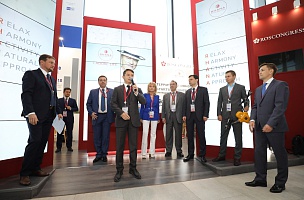CONCLUSIONS
Development
of artificial intelligence (AI) requires strategic approach
“National strategies have been launched in 30 countries, while 10 others are working on it. Not everyone understands what exactly is to be done, but a strategic vision is necessary,” Kay Firth-Butterfield, Head, Artificial Intelligence and Machine Learning, World Economic Forum.
“In 2019, 32 countries have admitted the importance of AI for the national economy, social relations, and security, and adopted their strategies. These countries include the US, China, the Netherlands, France, Japan, the UAE. Russia has approved the national strategy last year. We weren’t the first, that’s why we had a chance to explore best practices to develop a strategy,” Oksana Tarasenko, Deputy Minister of Economic Development of the Russian Federation.
AI
being essential economic growth driver for coming years
“At the time of the technological revolution, the AI has potential to be a driver of deep social and economic change. By 2030, the AI-related global economic activity will reach USD 13 trillion, which will provide additional 1.2% to GDP annually,” Oksana Tarasenko, Deputy Minister of Economic Development of the Russian Federation.
Transition
from weak AI to strong AI is promising
“The main areas of AI development are human language understanding, computer vision, and self-driving cars,” Zhang Zhuo Chang, Guangzhou Technology, People’s Republic of China.
“AI must work as regular human mind being able to solve a wide range of problems, that’s what we call ‘strong AI’,” Kay Firth-Butterfield, Head, Artificial Intelligence and Machine Learning, World Economic Forum.
Quality
and availability of data being the basis for successful development of AI
projects in machine learning
“We do not have enough data, but it is important for us to thing how we can develop the economy using AI. Bad data means bad decisions. This also works for an AI-based economy,” Kay Firth-Butterfield, Head, Artificial Intelligence and Machine Learning, World Economic Forum.
“We lack information. Microsoft has enormous datasets from their customers. They can use the data to develop AI. But we don’t have such companies in Korea,” Cha Jung Hoon, Deputy Minister of Small and Medium-sized Enterprises and Start-ups of the Republic of Korea.
PROBLEMS
AI
being underdeveloped in Russia
“We have similar goals – we want to become leaders. The US is trying to overtake China that is very advanced in AI. Russia is not very competitive compared with the leading countries. We are not even in top 10 in some areas, and that is what we are to manage,” Maхim Yeremenko, Senior Managing Director, Data Research Competency Development Center, Sberbank.
Absence
of regulatory framework for data usage in AI development
“What the data usage regulations will be like? It is a critical question,” Kay Firth-Butterfield, Head, Artificial Intelligence and Machine Learning, World Economic Forum.
“Safety and security are political and ethical issues, but as soon as we come to common understanding of the protocol, we will be able to agree on these matters. We are trying to develop an industrial data exchange protocol. We do not have any regulations at the moment,” Cha Jung Hoon, Deputy Minister of Small and Medium-sized Enterprises and Start-ups of the Republic of Korea.
Serious
ethical issues with AI
“Personal data security and use is a pressing issue in Russia. Only 18% of people are ready to share their bank details,” Alexander Ivlev, CIS Managing Partner, Deputy Regional Accounts Leader for Central, Eastern and Southeastern Europe & Central Asia, EY.
“Our experience shows that the more people know about there their information goes and how it’s used, the less they want to share it,” Kay Firth-Butterfield, Head, Artificial Intelligence and Machine Learning, World Economic Forum.
No
strategic vision of risks posed by AI development
“What are the prospects of AI, what will happen in 50–100 years? What implications of AI development we will face?” Alexander Ivlev, CIS Managing Partner, Deputy Regional Accounts Leader for Central, Eastern and Southeastern Europe & Central Asia, EY.
SOLUTIONS
Ongoing
evolution of AI national strategy
“A national strategy is needed when the game rules for the state, business, and science must be set. It is important how often this document is updated. Technology quickly goes out of date, that’s’ why it is important to always stay on top,” Maхim Yeremenko, Senior Managing Director, Data Research Competency Development Center, Sberbank.
“National AI strategy suggests ongoing development,” Cha Jung Hoon, Deputy Minister of Small and Medium-sized Enterprises and Start-ups of the Republic of Korea.
Economic incentives for AI development
“We provide subsidies and grants for start-ups. We have vouchers to get big data, since companies often do not know that kind of data they need. After a start-up reaches a certain level of development, the state exchanges the data for vouchers. We have introduced and inclusiveness campaign. <…> We encourage the giants to support small and medium businesses by creating inclusive conditions for specialists or data sharing. Our goal is to support 30,000 enterprises by 2030,” Cha Jung Hoon, Deputy Minister of Small and Medium-sized Enterprises and Start-ups of the Republic of Korea.
Engaging
SME in data storage and processing
“Small and medium enterprises should be engaged in information exchange, cross-border projects should be developed. We need to build a global platform that would embrace small and medium enterprises. As soon as the platform is there, we will be able to effectively analyse data and use AI,” Cha Jung Hoon, Deputy Minister of Small and Medium-sized Enterprises and Start-ups of the Republic of Korea.
“We are concerned about SME, because they account for a lion’s share of economy in many countries, however, there is a problem of data quality,” Kay Firth-Butterfield, Head, Artificial Intelligence and Machine Learning, World Economic Forum.
Development
of international partnerships and implementation of cross-border projects in AI
“We are planning to
create a port for free data turnover on Hainan Island. Everyone will
be able to share the existing data. You can use your algorithms and try out
your models on the big data provided by China,” Zhang Zhuo Chang, Guangzhou
Technology, People’s Republic of China.
“Our goal is to find partners for information collection and exchange,” Cha Jung Hoon, Deputy Minister of Small and Medium-sized Enterprises and Start-ups of the Republic of Korea.
Finding
balance between AI utility and ethics of its use
“A balance on ethical issues of AI development must be found. The Russian strategy strongly emphasises ethical aspects, which is very good,” Cha Jung Hoon, Deputy Minister of Small and Medium-sized Enterprises and Start-ups of the Republic of Korea.
“People must understand the benefits of digitalisation and AI. They must see that changes are good,” Alexander Ivlev, CIS Managing Partner, Deputy Regional Accounts Leader for Central, Eastern and Southeastern Europe & Central Asia, EY.
“AI-based video surveillance leads to privacy issues, however, not so many people would stop using video surveillance in nursery schools. Socially beneficial applied cases of shark monitoring in Australia are extremely useful. The main point is the benefits, which reduces concerns about negative impact,” Maхim Yeremenko, Senior Managing Director, Data Research Competency Development Center, Sberbank.
Gradual
development of regulatory framework for collection, storage, and use of data
“We are very concerned about personal data security. A national organization is being built to work out rules of AI development,” Zhang Zhuo Chang, Guangzhou Technology, People’s Republic of China.
“We do not know what information machines generate. Everyone thinks that humans are the source of data, but it is not exactly like that. Very often we receive information from machines, and we need to control it. <…> We must think, what information is produced by machines and by humans and how it is related,” Cha Jung Hoon, Deputy Minister of Small and Medium-sized Enterprises and Start-ups of the Republic of Korea.
For more information, visit
the Roscongress Foundation's Information and Analytical System at roscongress.org/en.






